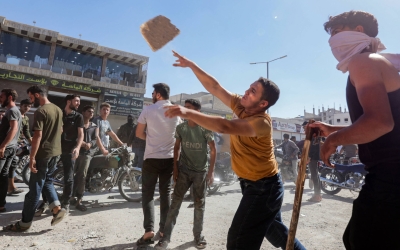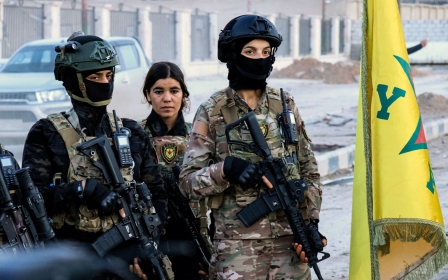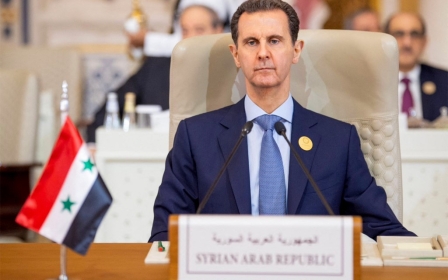Erdogan plans to invite Syria's Assad to Turkey

Turkish President Recep Tayyip Erdogan may invite Syria's Bashar al-Assad to Turkey for an official visit through Russian mediation.
“We, together with Russian President Vladimir Putin, may have an invitation to Bashar Assad,” Erdogan told a group of journalists that accompanied him on a trip to a Shanghai Cooperation Organisation summit in Kazakhstan on Friday.
“If Mr Putin can visit Turkey, this could be the beginning of a new process. All the years that have passed in Syria have clearly shown everyone that a permanent solution mechanism must be established.”
Putin has postponed a visit to Turkey since last year over some bilateral issues, such as dropping trade and problems regarding banking transactions due to the US secondary sanctions targeting the finance services.
Erdogan and Putin met on Wednesday on the sidelines of the summit. A Turkish readout suggested Syria was among the topics that had been discussed.
New MEE newsletter: Jerusalem Dispatch
Sign up to get the latest insights and analysis on Israel-Palestine, alongside Turkey Unpacked and other MEE newsletters
Erdogan last week told the media that he was ready to talk to the Syrian president, who had signaled that he dropped some of the preconditions for such a meeting, such as complete withdrawal of Turkish forces from northern Syria.
Iraqi mediation efforts, led by Prime Minister Mohammed Shia Sudani, have sought to convince the Assad's government to engage with Turkey, and have made significant progress, sources familiar with the issue told Middle East Eye.
A senior Iranian official told his counterparts in Ankara last month that they, too, were pressuring Damascus to lift its preconditions for dialogue with the Turkish government, according to a person close to the discussions.
The source suggested that the Iranians had not wanted to be sidelined while Iraqi efforts were making headway.
"It will not be easy"
Ankara believes the time has come to launch talks with Damascus to facilitate the eventual return of refugees and establish an alliance against Kurdish armed groups in northeastern Syria.
But Turkish officials are aware that these efforts will take an extensive amount of time to succeed and it will not be easy.
“It is essential for Syria, whose infrastructure has been destroyed and its people have become scattered, to get back on its feet and to end the instability,” Erdogan said.
He added that such instability also provides fertile ground for Kurdish armed groups, such as Kurdistan Workers’ Party (PKK) and its offshoots in Syria, which Turkey deems terrorist organisations.
“The winds of peace that will blow in Syria and the atmosphere of peace that will come to life throughout Syria are also necessary for the return of millions of people scattered across various countries to their countries,” Erdogan said.
“We have always extended our hand of friendship to our neighbour Syria, and we will continue to do so.”
Erdogan, however, said that Ankara still expects some reforms in Syria, such as a new social contract, which is “fair, honorable and inclusive”, that would unite the whole country, which is divided between warring administrations and groups, and achieve domestic peace.
Erdogan’s messages regarding a meeting with Assad, and attacks on Syrian refugees earlier this week destabilised Turkish-controlled areas in northern Syria on Monday.
Unprecedented protests took place in multiple cities in northern Syria, with demonstrators attacking cars and trucks with Turkish plates, damaging and burning some of them.
Footage also showed Turkish armored vehicles, and some military outposts were struck with bullets in Afrin and Azaz.
Since Syria's civil war erupted in 2011, Ankara, along with its western partners, supported the Syrian opposition, cutting ties with Assad, who once enjoyed a close relationship with Erdogan.
However as the Islamic State group established control in Syria, and Russia moved into the country to support Assad, Turkey changed its objectives in 2016.
Ankara began focusing primarily on the Kurdish armed groups, conducting offensives in northern Syria along the border, seizing cities like Afrin, al-Bab, and Azaz, and bringing some rebel factions under its control.
Middle East Eye delivers independent and unrivalled coverage and analysis of the Middle East, North Africa and beyond. To learn more about republishing this content and the associated fees, please fill out this form. More about MEE can be found here.





